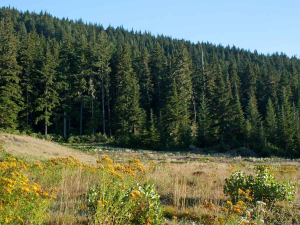ETS costs cut 66% for forest owners – McClay
Additional reductions to costs for forest owners in the Emissions Trading Scheme Registry (ETS) have been announced by the Government.
 New research led by a University of Canterbury academic has identified that conventional seed banking alone isn’t enough to conserve all of New Zealand’s endemic plants.
New research led by a University of Canterbury academic has identified that conventional seed banking alone isn’t enough to conserve all of New Zealand’s endemic plants.
New research led by a University of Canterbury academic has identified that conventional seed banking alone isn’t enough to conserve all of New Zealand’s endemic plants.
Dr Sarah Wyse, who lectures in the School of Forestry at the University of Canterbury (UC) says protection of the environment is the first line of defence for plant conservation with the preservation of native plant species in artificial seedbanks - known as ex situ conservation – as an important backup.
Her team’s research shows that 80% of New Zealand’s woody plant species can be successfully preserved using conventional seed banking, in which seeds are dried and frozen for long-term storage.
This accessible process can be undertaken by conservation groups and citizen scientists outside of laboratories as it doesn’t require specialized equipment or expertise.
However, seeds from some plants – especially New Zealand’s tall forest trees, with large bird-dispersed seeds, cannot be successfully conserved this way.
“Tropical rainforest seeds shed while they’re metabolically active so they can germinate quickly, but this makes them more problematic as you can’t dry or freeze them,” says Wyse.
“New Zealand has a number of trees closely related to tropical rainforest species, and these are the ones that may prove tricky,” she explains.
Conservation of these seeds requires more complex techniques such as cryopreservation, in which the seed embryo or other plant tissues are stored in liquid nitrogen. Currently, little is known about how to perfect that process of New Zealand native seeds.
Wyese says some of the forest taonga (treasures) that may pose difficulties for artificial seedbank construction include dominant canopy trees such as rimu, kohekohe, swamp maire, kahikatea, tōtara, and kauri.
As these species face additional threats from predation, pollinator extinction, climate change, and pathogens like myrtle rust and kauri dieback, effective ex situ conservation is critical.
While gaps in existing knowledge are concerning, Wyse says she is encouraged by the number of organisations committed to seed conservation.
In Canterbury, this includes Māori biosecurity initiative, Te Tira Whakamātaki, who bring significant mātauranga (Māori knowledge) to the field. She also notes a growing interest in seedbanks from arboretums and botanical gardens.
Dr Wyse’s research, coauthored with Thomas Carlin, Thomas Etherington, Aisyah Faruk, John Dickie, and Peter Bellingham, is published in the journal Pacific Conservation Biology.
The research was funded by a grant from the Ministry of Business, Innovation and Employment through New Zealand’s Biological Heritage National Science Challenge.
The 5+ A Day Charitable Trust has launched a collection of affordable recipes designed to turn everyday vegetables into seasonal stars.
Jane Mellsopp has been confirmed as the new Government Appointee to the New Zealand Meat Board (NZMB).
To celebrate the tenth anniversary of its annual Good Deeds competition, Rabobank will give away $100,000 to improve rural community hubs, schools, clubrooms, and marae across New Zealand.
Agricultural and veterinary product supplier Shoof International has appointed Michaela Dumper as its new chief executive.
Federated Farmers is celebrating following the Government's announcement that young farmers will be able to use their KiwiSaver funds to buy their first home or farm.
The Meat Industry Association of New Zealand (MIA) today announced that Chief Executive Officer Sirma Karapeeva has resigned from the role.